Publications
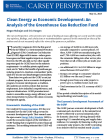
May 12, 2025
In this perspectives brief, authors Megan Mahajan and Eric Hangen discuss new analysis by Energy Innovation that has now estimated how far the Greenhouse Gas Reduction Fund will go toward its economic development goals.
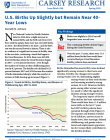
April 24, 2025
In this brief, author Kenneth Johnson reports that New National Center for Health Statistics data for 2024 show a slight increase in annual births and the birth rate from 2023.
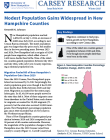
March 18, 2025
In this brief, author Kenneth Johnson reports that New Hampshire’s population reached 1,409,032 on July 1, 2024, an increase of 6,800 since July 2023, according to new Census Bureau estimates.
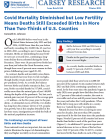
March 13, 2025
In this brief, author Kenneth Johnson reports that only 3,606,000 babies were born in the United States between July 2023 and July 2024, according to new Census Bureau estimates. This is 43,000 fewer babies than the year before, which barely exceeds the 43-year low in 2020–2021.

February 18, 2025
In this primer, authors Harshita Sarup and Jess Carson describe the New Hampshire Child Care Scholarship Program after recent policy changes.
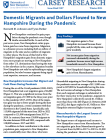
January 21, 2025
In this brief, authors Kenneth Johnson and Tyrus Parker report that New Hampshire had a net migration gain of 26,000 during the era of the Covid pandemic (from 2020 to 2022). This was a significant increase from the net migration gain of 17,000 in the three years prior to the pandemic.
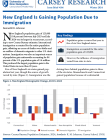
December 19, 2024
In this brief, author Kenneth Johnson reports that New England’s population gain of 123,000 (0.8 percent) between July 2023 and July 2024 was its largest in recent years, according to new Census Bureau estimates.
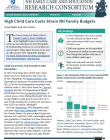
November 19, 2024
In this primer, authors Tyrus Parker and Jess Carson discuss the cost of child care for New Hampshire families.
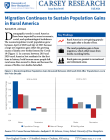
November 13, 2024
In this brief, author Kenneth Johnson reports that rural America is now gaining population again after a decade of loss.
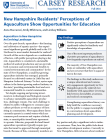
October 30, 2024
In this brief, authors Anna Maccaroni, Emily Whitmore, and Lindsey Williams discuss the results of a June 2024 statewide survey of New Hampshire residents to understand their perceptions of aquaculture.

October 23, 2024
In this brief, authors Dante Scala and Kenneth Johnson estimate how much a slightly better (or worse) performance by the candidates in the rural areas of seven battleground states could influence the outcome of the 2024 election.
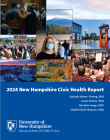
October 7, 2024
Since the 2020 New Hampshire Civic Health Index was published, there have been significant changes to the country that may have impacted civic health in New Hampshire. We have experienced the Covid-19 pandemic, a rise in social justice efforts, the 2020 presidential election, and the January 6th attack on the United States Capitol. This report focuses on the civic health of New Hampshire from…
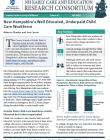
September 30, 2024
In this primer, authors Rebecca Glauber and Jess Carson discuss New Hampshire’s child care workforce.

September 30, 2024
In this primer, authors Jess Carson and Harshita Sarup discuss New Hampshire’s “supply” of child care.
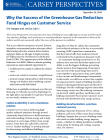
September 24, 2024
In this perspectives brief, authors Eric Hangen and Jessica Luk-Li stress that while there is justifiable excitement over the new
GGRF financing, success in deploying it to the right places and people will only happen if those involved get laser-focused on two words: customer service.

September 6, 2024
This brief discusses data collected by researchers at the University of New Hampshire in spring 2024 better understand the landscape of preschool offerings in New Hampshire’s public schools.

August 29, 2024
In this literature review, authors Robert Lynch and Michael Ettlinger examine the economic impact of large-scale deportations of unauthorized immigrants from the United States on U.S. citizens and authorized immigrants. The impact of such programs on those deported has been little examined in the academic literature and is assumed to be substantial and negative.
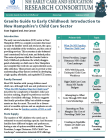
August 13, 2024
The series of primers discussed in this overview, titled the Granite Guide to Early Childhood, synthesizes the widely disaggregated scholarship on child care in New Hampshire and compiles this work into an unprecedented accessible collection.
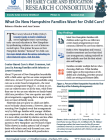
August 12, 2024
In this primer, authors Rebecca Glauber and Jess Carson describe the complexity of families’ child care decision making, shaped by preference and the reality of available offerings.
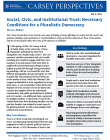
July 2, 2024
In this perspectives brief, author Bruce Mallory discusses how trust in social, civic, and institutional structures is a necessary ingredient for a healthy democratic society.
